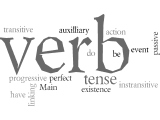Different kinds of verbs

For anyone who struggles with the English language, one solution is knowing and understanding about different kinds of verbs and their functions.
What is a verb: Just to review, a verb is one of the parts of speech, a word that performs a certain role in a sentence. Examples of other parts of speech are nouns, adjectives, adverbs, conjunctions, pronouns and interjections.
What exactly does a verb do? A verb describes what the subject of a sentence is doing, or being at a certain point in time.
Main verbs, event verbs, state verbs, Linking verbs
In the English language, verbs perform several tasks. They describe an event or an action that one took to create this event. Or, they describe more passive states of being or existing.
Main verbs - These stand on their own and don't need to be accompanied by other verbs. We use them in simple tenses (present and past especially) and the main verb usually follows the subject of the sentence (I'm assuming you have some English Grammar knowledge).
Here are examples of a plain main verbs:
- I broke the nozzle.
- I know the song.
Event verbs are action verbs. Example: break, describe, write, jump, walk
State Verbs: If you are using a state verb, the subject of the sentence isn't really doing anything action-oriented. Here are some examples:
- be - I am quiet for now.
- exist - He is a carpenter.
- belong - The dog belongs to us.
- own - We own a car.
State verb also express a mental state, for example: I enjoy his company. I despise winter.
Linking verbs, Auxiliary verbs asnd Modal verb
Some verbs describe both events and states ( they are somewhat active, or they are passive)
- Feel
- Smell
- Taste
- Have
- Appear
Linking verbs
The above verbs are also linking verbs. These link to information that further describes the subject of the sentence (usually an adjective or an adjective clause, also known as the complement of the sentence).
- It feels great.
- The milk tastes sour.
- The cheese smells bad.
- I have doubt.
- He appears sad.
Auxiliary verbs
Typical helping verbs are "be" "do" and "have". While these verbs are irregular and also used alone as main verbs, they also work alongside main verbs to do the following:
Create Passive voice - For example: The store has been closed by the health board.
Continuous tense (with have and be) - Tom has been sleeping for a few hours.
Perfect tense (with helping verb have)- Tom had already eaten when we arrived.
Formulate questions with the verb "to do" - Does he know where he is going?
Modal verbs
Modal verbs are also auxiliary verbs. Examples are words such as can, could, may, might, must, shall, should, will, and would. A modal verb works with other main verbs to denote different moods such as possibility, ability and obligation. Unlike the auxiliary verbs above, these verbs never function as main verbs in a sentence.
Transitive and Instransitive
If a verb is transitive, it means that the verb helps subject in the sentence to act upon something or someone.
For example: I gave her a present. The verb give is transitive, and acts on the pronoun "her".
An intransitive verb does not take an object or act on anyone or anything. I jump, I walk, I weep, I fall--none of these verbs have an object. Nothing is being done to anyone. Nothing is being acted upon.
Phrasal verbs
Phrasal verbs are two word phrases that function as verbs do. Typically, they consist of verb and adverb units or a verb and a preposition unit. There are a lot of phrasal verbs in the English language. They are somewhat idiomatic, and it takes a while to get familiar with their different meanings. Here are some examples:
- Back up
- Ask around
- Break down
- Call on
- Call up
- check out
- Cut down
To sum up
This is just a brief snapshot of different kinds of verbs in the English language. To improve your English or even the quality of your writing, be sure that you understand verbs and how they work. Verb errors are among the most common errors I see in my students.
Other grammar hubs
- What are multi word verbs
What are multi-word verbs? As their name suggests they are verbs that are made up up more than one word. Usually this involves a verb, and a word (often a preposition) a particles (some multi-word verbs have more than one particle)/ articles can be a - Some lessons from the elements of style part 2
William Strunk's The Elements of Style, first published in 1918 and available for free in the public domain evolved into a book of the same name by Strunk and E.B White and is a classic writer's manual. Even in 1918, Strunk described the key points o - Fixing apostrophe errors
Apostrophe ignorance is rampant. To give you an example, a flier arrived in my mailbox at the college where I teach communications. - Different types of adverbs
Adverbs are confusing to both native and native speakers of English alike. One reason is that there are different types of adverbs, another is that they perform different roles, and a third reason is that they can be inserted into different places of - Different types of nouns
For many students of English, understanding the core parts of speech is very important. The noun is one of these, and there are different types of nouns in English. What exactly are nouns anyway? A noun describes a person, place or thing. I'm sure y - Different kinds of adjectives
Adjectives can certainly be confusing to native and non-native speakers alike. Many learners tend to be more concerned with an adjective's meaning rather than its grammar. So here is some information about understanding about different kinds of adjec - Fixing apostrophe errors
Apostrophe ignorance is rampant. To give you an example, a flier arrived in my mailbox at the college where I teach communications. - Five common grammar mistakes students make, and how ...
f you want to improve your grade by 5-10 percent on your winter term papers, then you need to avoid these five common grammar mistakes my students make on their assignments. Subject-verb agreement Sentence fragments Run-on sentences Comma splices Apo - TOEIC vs TOEFL IBT
f English is not you're first language and you're planning to go to a university where instruction is English or to work for firm with a global presence, then you may find yourself confronting with having to take either a TOEFL test or a TOEIC test. - Some lessons from the elements of style- Part 1
The Elements of Style first appeared in 1918. Written in 1918, the most updated version by William Strunk Jr. and E.B. White is a favorite reference manual for those of us who write. I recently took a look at the Strunk's first version of the book, a








